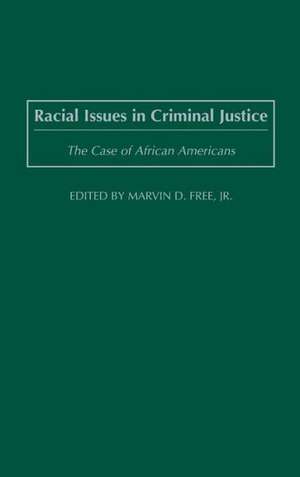Racial Issues in Criminal Justice: The Case of African Americans: Criminal Justice, Delinquency, and Corrections
Autor Marvin D. Freeen Limba Engleză Hardback – 29 sep 2003 – vârsta până la 17 ani
Preț: 463.05 lei
Preț vechi: 638.72 lei
-28% Nou
Puncte Express: 695
Preț estimativ în valută:
88.63€ • 96.31$ • 74.50£
88.63€ • 96.31$ • 74.50£
Carte tipărită la comandă
Livrare economică 21 aprilie-05 mai
Preluare comenzi: 021 569.72.76
Specificații
ISBN-13: 9780275975623
ISBN-10: 0275975622
Pagini: 288
Dimensiuni: 156 x 235 x 26 mm
Greutate: 0.58 kg
Ediția:New.
Editura: Bloomsbury Publishing
Colecția Praeger
Seria Criminal Justice, Delinquency, and Corrections
Locul publicării:New York, United States
ISBN-10: 0275975622
Pagini: 288
Dimensiuni: 156 x 235 x 26 mm
Greutate: 0.58 kg
Ediția:New.
Editura: Bloomsbury Publishing
Colecția Praeger
Seria Criminal Justice, Delinquency, and Corrections
Locul publicării:New York, United States
Notă biografică
Marvin D. Free Jr. is associate professor of Sociology at the University of Wisconsin, Whitewater. He has published extensively in journals such as Critical Criminology, Journal of Black Studies, Deviant Behavior, Youth & Society, Contemporary Justice Review, and the Encyclopedia of Violence, Peace, and Conflict. He is also the author of African Americans and the Criminal Justice System, and the coauthor of Crime, Justice, and Society: Criminology and the Sociological Imagination.
Cuprins
Series ForewordPrefaceRace and Criminal Justice in the United States: Some Introductory Remarks by Marvin D. Free, Jr.The Significance of Race in American Society: Past and PresentMarginalization and Racial Stratification in the Academic Discipline of Criminal Justice by Robert EngvallSlavery's Legacy? Private Prisons and Mass Imprisonment by Michael A HallettThe Color of Prime-Time Justice: Racial Characteristics of Television Offenders and Victims by Sarah EschholzCriminal Justice Responses to Crime and African AmericansPicasso as a Criminologist: The Abstract Art of Racial Profiling by Michael J. Lynch and Amie M. Schuck"Driving While Black": Corollary Phenomena and Collateral Consequences by Katheryn K. RussellA Critical Examination of Hate Crime Scholarship and the Underrepresentation of African Americans in Victimization Research by Bryan D. Byers, Paul J. Becker, and Kelly J. OpiolaRace and Presentencing Decisions: The Cost of Being African American by Marvin D. Free, Jr.Trying Juveniles as Adults: A Case of Racial and Ethnic Bias? by Becky TatumThe Racist Application of Capital Ppunishment to African Americans by David V. BakerSeeking SolutionsDo African American Police Make a Difference by Helen Taylor GreeneThe Myth of Black Juror Nullification: Racism Dressed Up in Jurisprudential Clothing by Elissa Krauss and Martha SchulmanEmbracing Affirmative Jury Selection for Racial Fairness by Hiroshi FukuraiHow "Restorataive" is Restorative Justice? An Oppression Theory Critique by Robert ConnersIndex
Recenzii
Early in the 21st century, race continues to be a disturbingly significant criminal justice variable. Free has brought together 14 articles by criminologists exploring the race variable as illustrated by the case of African Americans . . . this volume offers valuable information and insights bearing on one of the principal enduring challenges confronting the U.S. criminal justice system-addressing more successfully the long, pernicious legacy of racism. Recommended. Upper-division undergraduates and above.
It is important that the author does not just point out that race plays a pivotal part in the American criminal justice system, but he offers possible solutions toward making the criminal justice system live up to ideas of a race value-neutral system that guarantees fundamental fairness and justice for all Americans, specifically African Americans. . . . This book should give undergraduate students an overall understanding of racial issues in the criminal justice system that negatively affect African Americans.
It is important that the author does not just point out that race plays a pivotal part in the American criminal justice system, but he offers possible solutions toward making the criminal justice system live up to ideas of a race value-neutral system that guarantees fundamental fairness and justice for all Americans, specifically African Americans. . . . This book should give undergraduate students an overall understanding of racial issues in the criminal justice system that negatively affect African Americans.

















